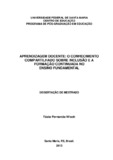| dc.creator | Wisch, Tásia Fernanda | |
| dc.date.accessioned | 2014-09-16 | |
| dc.date.available | 2014-09-16 | |
| dc.date.issued | 2013-06-25 | |
| dc.identifier.citation | WISCH, Tásia Fernanda. TEACHING LEARNING: KNOWLEDGE SHARING ON INCLUSION AND CONTINUING EDUCATION IN ELEMENTARY EDUCATION. 2013. 164 f. Dissertação (Mestrado em Educação) - Universidade Federal de Santa Maria, Santa Maria, 2013. | por |
| dc.identifier.uri | http://repositorio.ufsm.br/handle/1/7097 | |
| dc.description.abstract | This research is part of the Research Line Training, Knowledge and Professional Development Program for Postgraduate Education, Federal University of Santa Maria / RS. The study focuses on understanding how shared reflective practice contributes to the learning of teaching in basic education in an inclusive setting. The main theoretical reflections that contribute to this research in the context of inclusion are: Mantoan (2008), Freitas (2008), Fonseca (2003), Freire (2005, 2009), Martins (2010), Rodrigues (2008), Dutra (2008) and Bayer (2006). Speaking about the concept of activity we come from studies considering Vygotski (1994, 1995, 2009), Leontiev (1984, 1978, 1998) Davidov and Markova (1987), Rossetto (2013). Regarding the training of teachers we take into consideration of Bolzan (2002, 2007, 2009, 2010), Ferry (2004), Marcello Garcia (1999) Michels (2009), Nóvoa (1992, 1997) and Imbernon (2005, 2006, 2010). To discuss about the reflection and action, we highlight Zeichner (1993) and Shön (1997). The research takes part from a training event geared for inclusive processes in which teachers of a public school in Ijuí / RS proposed to discuss inclusion. The methodology used is the qualitative approach of narrative sociocultural nature, which has semi-structured interview as an instrument of data collection. In order to illustrate the research context, we also used daily meetings which were written by the researcher. From the recurrence narratives of the collaborators and the diaries it was possible to emphasize one category that we called Learning Teaching. This category is guided by the desire of learning, seeking new learning and learning from another person. Thus, this category is formed by categorical dimensions: Conceptions of Inclusion, Collaborative work and Spaces / places of training, these dimensions, which are interwoven together and consolidate the process of learning to teaching in a context of inclusion. | eng |
| dc.format | application/pdf | por |
| dc.language | por | por |
| dc.publisher | Universidade Federal de Santa Maria | por |
| dc.rights | Acesso Aberto | por |
| dc.subject | Aprendizagem docente | por |
| dc.subject | Formação continuada | por |
| dc.subject | Inclusão | por |
| dc.subject | Teacher learning | eng |
| dc.subject | Continuing education | eng |
| dc.subject | Inclusion | eng |
| dc.title | Aprendizagem docente: o conhecimento compartilhado sobre inclusão e a formação continuada no ensino fundamental | por |
| dc.title.alternative | Teaching learning: knowledge sharing on inclusion and continuing education in elementary education | eng |
| dc.type | Dissertação | por |
| dc.description.resumo | Esta pesquisa está inserida na Linha de Pesquisa Formação, Saberes e Desenvolvimento Profissional do Programa de Pós-graduação em Educação da Universidade Federal de Santa Maria/RS. O estudo tem como foco compreender como a prática reflexiva compartilhada, contribui para a aprendizagem da docência na educação básica num contexto inclusivo. Os principais teóricos que contribuem com as reflexões desta pesquisa no âmbito da inclusão são: Mantoan (2008), Freitas (2008), Fonseca (2003), Freire (2005, 2009), Martins (2010), Rodrigues (2008), Dutra (2008) e Bayer (2006). Ao falar sobre o conceito de atividade partimos dos estudos de Vygotski (1994, 1995, 2009), Leontiev (1984, 1978, 1998) Davidov e Markova (1987), Rosseto (2013). No que tange a formação de professores utilizamos Bolzan (2002, 2007, 2009, 2010), Ferry (2004), García (1999)Michels (2009), Nóvoa (1992, 1997) e Imbernón (2005, 2006, 2010,). Para discutir acerca da reflexão e da ação, destaco Zeichner (1993), Marcello Garcia (1999) e Shön (1997). A investigação parte de um evento formativo voltado para os processos inclusivos, no qual professores de uma escola pública municipal de Ijuí/RS se propuseram a discutir inclusão. Como metodologia utilizamos a abordagem qualitativa narrativa de cunho sociocultural, que tem as entrevistas semi-estrutudas como instrumento de coleta de dados. A fim de ilustrar o contexto da pesquisa, também utilizamos os diários das reuniões, escritos pela pesquisadora. A partir das recorrências narrativas das colaboradoras e dos relatos nos diários foi possível evidenciar uma categoria que denominamos Aprendizagem Docente. Esta categoria é pautada no desejo de aprender, de buscar novas aprendizagens e aprender a partir do outro. Dessa forma, esta é constituída por dimensões categoriais: Concepções de Inclusão, Trabalho colaborativo e Espaços/lugares de formação, dimensões estas, que juntas se entrelaçam e consolidam o processo de aprender a docência em um contexto de inclusão. | por |
| dc.contributor.advisor1 | Bolzan, Doris Pires Vargas | |
| dc.contributor.advisor1Lattes | http://buscatextual.cnpq.br/buscatextual/visualizacv.do?id=K4769237E6 | por |
| dc.contributor.referee1 | Santos, Mônica Pereira dos | |
| dc.contributor.referee1Lattes | http://lattes.cnpq.br/8795823734042859 | por |
| dc.contributor.referee2 | Henz, Celso Ilgo | |
| dc.contributor.referee2Lattes | http://buscatextual.cnpq.br/buscatextual/visualizacv.do?id=K4775823E8 | por |
| dc.contributor.referee3 | Veiga, Adriana Moreira da Rocha | |
| dc.contributor.referee3Lattes | http://buscatextual.cnpq.br/buscatextual/visualizacv.do?id=K4701517Y3 | por |
| dc.creator.Lattes | http://lattes.cnpq.br/6057161772828893 | por |
| dc.publisher.country | BR | por |
| dc.publisher.department | Educação | por |
| dc.publisher.initials | UFSM | por |
| dc.publisher.program | Programa de Pós-Graduação em Educação | por |
| dc.subject.cnpq | CNPQ::CIENCIAS HUMANAS::EDUCACAO | por |


